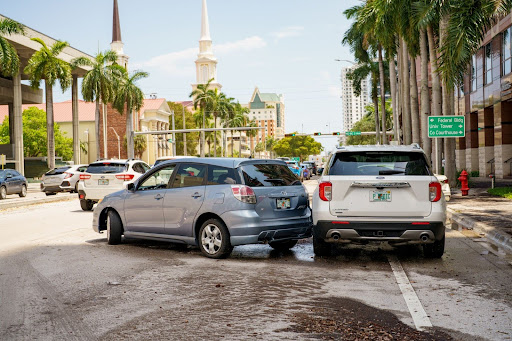How do I dispute car accident fault in Florida?
In Florida’s complex legal landscape, being wrongfully blamed for a car accident can have serious financial consequences, including increased insurance premiums, potential license points, and out-of-pocket expenses.
Florida’s no-fault insurance system doesn’t mean fault determination doesn’t matter–it absolutely does, especially for serious accidents that exceed PIP coverage limits.
Below, our West Palm Beach car accident lawyers walk you through the process of disputing fault determinations in Florida car accidents and explains when and how to seek professional legal assistance.
How insurance adjusters determine fault in Florida
Insurance adjusters typically consider:
- Traffic laws that may have been violated
- Police report findings
- Statements from drivers and witnesses
- Vehicle damage patterns
- Road conditions and traffic control devices
Common presumptions of fault include:
- Rear-end collisions (following driver presumed at fault per Florida case law, though rebuttable)
- Left-turn accidents (turning driver typically presumed at fault)
- Traffic signal violations
Step-by-step process to dispute fault
The insurance company’s initial fault determination is not final. With the right approach and representation, you can challenge inaccurate fault assignments and protect your rights under Florida law.
1. Contact your insurance company immediately
Florida has strict notification requirements. You have:
- 10 days to file a crash report with the DHSMV for accidents resulting in injury, death, or property damage over $500 (Florida Statute § 316.066)
- 30 days to report the accident to your insurance company (check your policy for specific requirements)
- 2 years statute of limitations for filing a personal injury lawsuit (Florida Statute § 95.11)
2. Submit a written dispute letter
You or your attorney should address the letter to the insurance company that made the determination of fault. Include:
- Your claim number
- Date of accident
- Clear statement disputing their fault determination
- Supporting evidence
- Request for reconsideration
Evidence to collect
Strong evidence is the foundation of any fault dispute. Collect:
- Detailed photos of all vehicles involved (damage locations, angles, road conditions)
- Police report (request corrections if factual errors exist)
- Witness statements and contact information
- Surveillance footage from nearby businesses
- Dashcam recordings
- Weather reports from the accident date
- Medical records documenting injuries
3. Request an insurance supervisor review
Your attorney may request this if the adjuster’s decision stands.
4. File a complaint
If the insurance company isn’t responsive, your attorney can file a complaint with the Florida Department of Financial Services’ Division of Consumer Services.
5. Consider mediation
Your attorney does this through the Florida Department of Financial Services under Florida Statute § 627.745.
Being wrongfully blamed in a crash is more common than you think
Rear-end accidents, left-turn collisions, and multi-vehicle pile-ups are among the most commonly disputed types of accidents.
Challenging rear-end collision presumptions
While Florida generally presumes the rear driver is at fault in rear-end collisions, exceptions exist, including:
- Front vehicle made a sudden stop without cause
- Front vehicle had non-functioning brake lights
- Front vehicle reversed unexpectedly
- Front vehicle changed lanes unsafely
Disputing left-turn accidents
Left-turning drivers aren’t always at fault when:
- The oncoming vehicle was speeding excessively
- The oncoming vehicle ran a red light
- The oncoming driver was distracted or impaired
- The intersection had malfunctioning signals
Multi-vehicle accidents
Complex chain-reaction crashes require thorough investigation. Often, the vehicle that initiated the sequence bears primary responsibility, but Florida’s comparative negligence system may distribute fault among multiple drivers.
How Lytal, Reiter, Smith, Ivey & Fronrath can help
The experienced car accident attorneys at Lytal, Reiter, Smith, Ivey & Fronrath understand the intricacies of Florida’s fault determination process. Our team can:
- Conduct an independent investigation of your accident
- Consult with accident reconstruction experts
- Identify and interview witnesses
- Review and challenge biased police reports
- Negotiate directly with insurance companies
- Represent you in mediation proceedings
- File a lawsuit if necessary and represent you in court
- Navigate Florida’s complex insurance laws on your behalf
If you’ve been wrongfully blamed for a car accident in Florida, contact Lytal, Reiter, Smith, Ivey & Fronrath for a free consultation. Our experienced team can evaluate your case, help gather crucial evidence, and fight to ensure you don’t bear unwarranted responsibility for an accident that wasn’t your fault.




